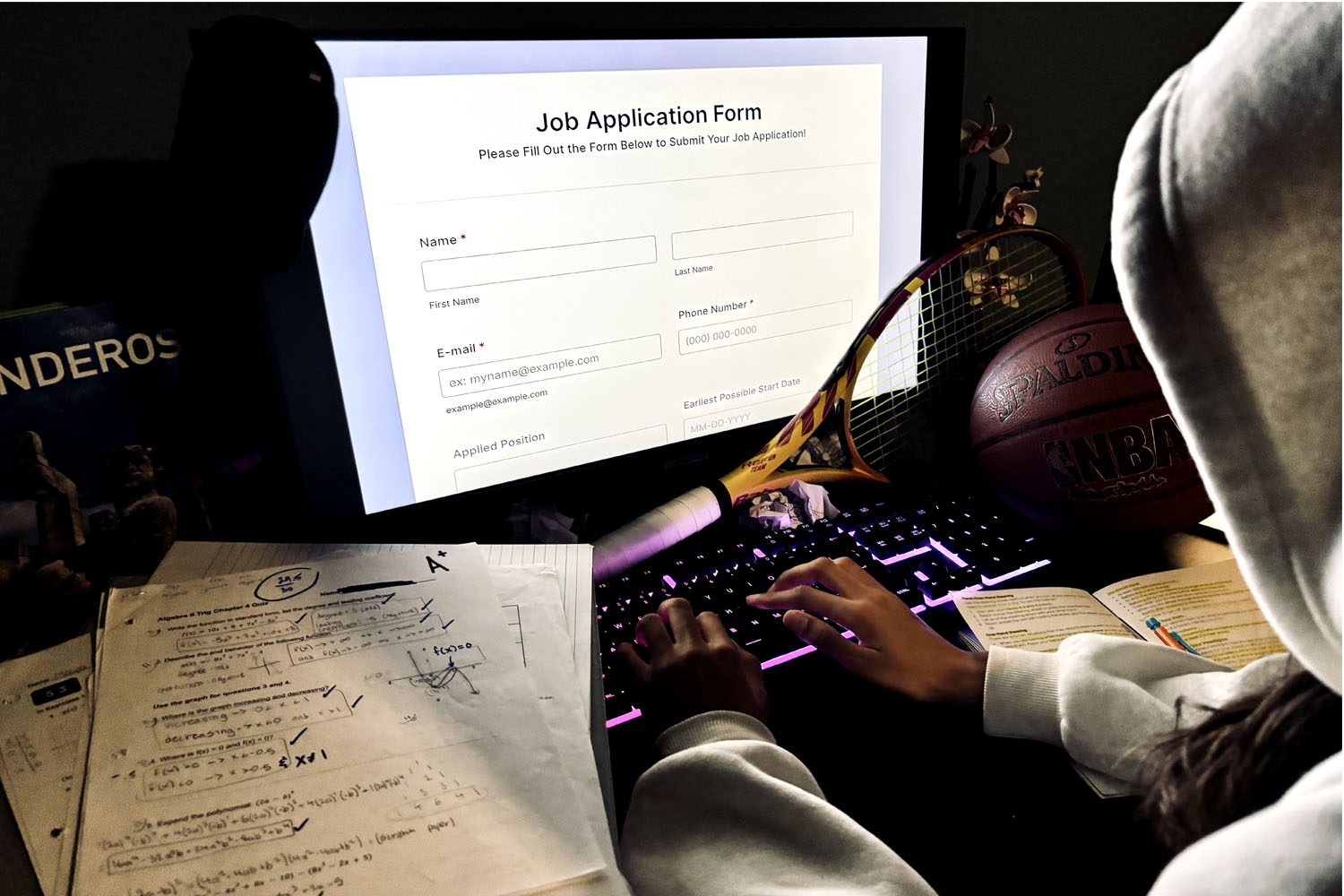The school bell rings across high schools in the United States. However, for about 5.5 million students, their work for the day is not done yet. These students trade their weekdays and weekends for work shifts, hoping to build resumes, make money, and gain real-world experience.
Nearly 20% of all high school teens get a job between the ages of 16 and 19, according to Statista. The role of employment in the lives of high schoolers is becoming more prominent as many wish to add to their college application, make money, or support their family.
However, it can also be a key factor in shaping their education, mental health, and life goals. With a job, high schoolers are faced with real-world situations and learn about what life is like after college.
“Getting a job opened my eyes to the real world,” said Yashvi Shah, a sophomore at Carlmont who works at Zalles Racquet Sports. “I have learned a lot of life skills from my job, and found that I have become more responsible since getting it.”
A new set of skills
High school students often have several responsibilities, from time management to building a work ethic after obtaining a job. These skills are essential to develop at a young age as they are used throughout life.
“I wanted to get a job to gain responsibility and gain those kinds of life skills,” said Chloe Khachadourian, a senior at Carlmont who works at Kumon, an after-school math and reading tutoring program. “I have definitely learned valuable skills from my job, from time management to being mature and calm when situations go awry.”
According to a study done by the University of Illinois, “above and beyond other factors known to influence life success, responsible behavior and interest in high school correspond to economic and career success 50 years later.” Having a job in high school has been shown to develop students’ maturity even further as they carry a weight of responsibilities that other high school students may lack.
“My time management skills have developed significantly since I started my job,” said Hana Yamawaki, a sophomore at Carlmont and a dance instructor. “I noticed that I have become so much more organized and better at being on time because my job relies heavily on me being able to do so.”
Surina De Beer, the owner of Zalles Racquet Sports, weighed on how she helps high school students develop necessary skills while working a job.
“I always ask the high school employees what skill they want to improve the most on through the job,” De Beer said. “I feel that having a job can be a great opportunity for them to grow.”
According to Laurence Steinberg, a psychologist who led a study on the emotional maturity of adolescents, teenagers often find it hard to resist peer pressure in heated situations. She found that most crimes committed by adolescents are not premeditated and are often done out of the stress of peer pressure. High schoolers with jobs are given opportunities to develop their emotional maturity as they are often put into stressful situations, from dealing with a screaming child to keeping track of the money for a business.
“When a parent gets mad or frustrated, you have to learn how to stay calm, take control of the situation, and try to help them out as best as possible,” Khachadourian said. “From the various situations I’ve been in, I have learned so much about controlling my emotions and handling stressful situations.”
Finding independence
Many high school students also need to make money and learn to manage it before going to college. As high schoolers develop a sense of freedom from their parents, many find independence by making monetary decisions.
“The main reason I got a job was to make money. I wanted to feel more independent and earn money so I could buy my own things without asking my parents for money,” Yamawaki said.
According to research done by Junior Achievement and Citizens, 54% of teenagers felt that they were unprepared to finance their future. High schoolers who have jobs often have to learn to manage their money as they receive paychecks and often have to pay taxes on the money they make.
“I learned that I need to create a spreadsheet that tracks all of the money I make from my job,” Shah said. “From the spreadsheet, I know exactly how much I have made and how many hours I worked.”
Lucia Rodriguez, a junior at Carlmont who works as a hostess at Elia, a restaurant in San Carlos, shared similar views about learning how to manage her money.
“I’ve been spending my parent’s money a lot of the time, and I wanted to make my own money to gain a sense of independence,” Rodriguez said. “I also want to learn how to keep track of my money, in addition to how to save it.”
The impact on college applications
Most high school students apply to a four-year college during their senior year, a process that requires students to build resumes and make themselves stand out. According to Forbes, the number of applicants to four-year colleges between the 2019-2020 and 2023-2024 cycles increased by 28%.
As college admissions continue to become more selective, high school students often look towards extracurricular activities, such as having a job, to differentiate themselves. According to the National Association for College Admission Counseling (NACAC), extracurricular activities are one of the main factors that colleges consider when looking at student applications.
“One of the main reasons I got a job was to be able to put it on my college application because I believe that it is something that could increase my acceptance chances,” Shah said.
Theresa Torres, the head academic counselor at Carlmont, also believes that having a job can strongly support a college application.
“It really depends on the student and their situation, but I think having a job benefits college applications when the job is related to them personally or the degree they are planning to have in college,” Torres said.
Torres also discussed how having a job can create meaningful skills, such as assertiveness and self-reliance, that could also improve a student’s college application.
“For most kids, I do think it is beneficial to work because it involves life skills building and is good for socialization,” Torres said. “I have seen students that really improved their confidence through having a job, and their new productivity was visible right away in school.”
However, Torres believes that having a job may not necessarily improve a student’s application if it is not relevant to themselves.
“Working at Starbucks may be fun, but if it causes a student’s grades to fall and does not have any significance on their application, I would encourage them to drop it,” Torres said. “I think they should put education first.”
Instead, she recommends students who are interested in getting a job to pick one that is particularly related to themselves.
“I would encourage students that were interested in getting a job to get one if it connects to the particular field they possibly want to go into during college,” Torres said.
The effect on health
Having a job during high school can often cause students to feel overwhelmed and exhausted. Students are already expected to manage more rigorous classes, extracurricular activities, and social life. Adding a job into the mix often adds to this stress and leaves little room for rest or downtime.
“Being a dance teacher is definitely demanding,” Yamawaki said. “It is hard to have to come from a long day of school and then have to be super energized for the little kids I teach. Sometimes, it feels overwhelming.”
According to Forbes, four out of five people say that work is their main source of stress. Having a job, especially in high school, can oftentimes be a source of anxiety as most jobs will have some kind of conflict to endure. This can deeply hurt a student’s mental health which in turn could affect their academic performance and social abilities.
“I definitely have felt stressed on the job, especially when a large amount of kids come into the tutoring center,” Khachadourian said. “It can be hard to balance everything out sometimes.”
Additionally, many students are losing sleep, which can impact their social and educational lives. According to the U.S. Center for Disease Control and Prevention, 72.7% of high school students do not get the proper amount of sleep every night.
“I have definitely lost sleep over my job,” Shah said. “I sometimes have a lot of schoolwork on the weekend, and having a job takes up a good chunk of my work time.”
Overall, high school students all face different impacts from having a job based on their experience. Multiple life lessons can be learned from jobs including independence and accountability.
“I feel that having a job is a great opportunity for me to gain independence, a skill that I think is one of the most important to learn in high school,” Shah said.




